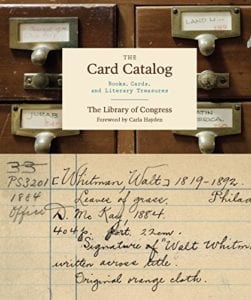
About the Book:
The Library of Congress brings booklovers an enriching tribute to the power of the written word and to the history of our most beloved books. Featuring more than 200 full-color images of original catalog cards, first edition book covers, and photographs from the library’s magnificent archives, this collection is a visual celebration of the rarely seen treasures in one of the world’s most famous libraries and the brilliant catalog system that has kept it organized for hundreds of years. Packed with engaging facts on literary classics—from Ulysses to The Cat in the Hat to Shakespeare’s First Folio to The Catcher in the Rye—this package is an ode to the enduring magic and importance of books.
Read an Excerpt:
Featured in June/July 2017 Issue: Welcome to the Library
Melville Louis Kossuth Dewey was two years old when Charles Jewett chaired the 1853 conference that kicked off a movement culminating with the codification of a cataloging system at the end of the century. Keenly interested in organizing and simplifying things at a younger age, he shortened his first name to Melvil, dropped his middle name altogether, and, briefly, even spelled his last name as “Dui.” While still an undergraduate at Amherst, Dewey was obsessed with bringing order to the school’s library, and he recounted that while daydreaming during a long lecture one day, “without hearing a word, my mind absorbed in the vital problem, the solution flasht over me so that I jumpt in my seat and came very near shouting ‘Eureka!’”
Dewey’s revolutionary approach to cataloging was a library classification system based on a controlled vocabulary of subject headings, represented by numerical values that could be subdivided further by decimals. Thus was born the Dewey Decimal Classification, a system that borrowed generously from Bacon, Jewett, and Cutter and attempted to encapsulate all knowledge in ten distinct classes. It immediately caught on and expanded Dewey’s influence within the library community. In hindsight there is no denying the impact his system had on libraries, but throughout his career Dewey remained a complicated figure, heralded as both a reformer and a genius in the library world, while at the same time being regarded as brash, stubborn, and difficult to work with.
The Centennial International Exhibition of 1876, the first major World’s Fair held in the United States, opened on May 10 in Philadelphia. The sprawling exhibition halls showcased rising American industrial power in more than 30,000 exhibits. Some one hundred librarians met there as well and, encouraged by Dewey and Cutter, among others, signed on as charter members of a new national organization, the American Library Association.
From The Card Catalog, The Library of Congress, Chronicle Books. Reprinted with permission. All rights reserved.
